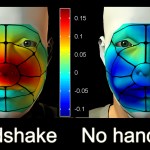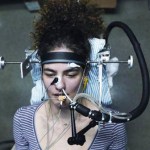Noam Sobel
Today's guest blogger is Idan Frumin, a student in the group of Prof. Noam Sobel in the Neurobiology Department. Their research on the transmission of odor compounds while shaking hands appears today in eLife.
It all started one day after lunch, sometime back in 2011. We sat in the lab’s living room (Yeah, we have a living room. And a bedroom. And a blind pet cat. But that’s a different story), when Noam asked – ever wonder why people shake hands?
– To show you don’t have a saber up your sleeve – I immediately retorted.
– But that seems odd, doesn’t it? After all, we’re not in the…
Get rid of your addictions while you sleep? Weizmann Institute researcher Dr. Anat Arzi is not promising this yet, but she and Prof. Noam Sobel have shown that changing bad habits through sleep conditioning could someday be possible. After just one session in the Neurobiology Department’s sleep lab, volunteers reported smoking on average 30% fewer cigarettes over the course of a week.
Volunteers given the same conditioning while awake did not reduce their nicotine consumption.
Arzi and Sobel had first demonstrated true sleep learning in 2012. This is the same conditioning that Pavlov…
Weizmann Institute scientists have created a “white smell.” Think about white light or white noise: Each mixes a bunch of different waves together from various parts of the visual or audible spectrum. Those wavelengths combine such that we perceive that unobtrusive light or sound we call “white.”
How do smells fit into this scenario? Prof. Noam Sobel and his group have already shown that smells have their own spectrum – ranging from pleasant to unpleasant – and that this relates to the chemical structure of the odor molecules. Is this spectrum truly analogous to that of light or sound? That…
“Imagine that you wake up in the morning feeling nothing special, yet you find yourself inexplicably behaving just a bit differently during the day. For example, you take a sniff every time you hear a tone,” says Prof. Noam Sobel. Of course, the people this actually happened to knew they had volunteered for a sleep experiment in Sobel’s lab. They knew that their sleep patterns had been closely monitored. But they had no recall, whatsoever, of the “lesson” they had learned while snoring peacefully. It was the sniffing that gave it away: While asleep, they had undergone conditioning to…
The olfactory membranes in your nose are densely packed with smell receptors. These receptors come in some 400 different subtypes; complex odors like that of rose petals can waft around 175 distinct kinds of odor molecules in the direction of your nose. In other words, the number of discrete odors we can perceive runs to the tens of thousands. No wonder scientists had thought that the whole smell arrangement was basically random.
But research by Prof. Noam Sobel and his team in the Weizmann Neurobiology Department is bringing our noses into line with our other sensory organs. The arrangement…
Did Israeli singer-songwriter Arik Einstein know something that scientists didn't when he released the song "When You Cry You're Not So Pretty" back in 1969?
Prof. Noam Sobel and his team of the Weizmann Institute of Science have now shown that merely sniffing a woman's tears - even when the crying woman is not present - reduces sexual arousal in men.
This study raises many interesting questions. What is the chemical involved? Do different kinds of emotional situations send different tear-encoded signals? Are women's tears different from, say, men's tears? Children's tears? This study…
Even severely paralyzed people on respirators can do it: They can sniff. That is, they can at least partially control the movement of air through their nostrils. And if they can sniff, they can use this action to write on a computer screen or steer a wheelchair. That's the principle behind a new device developed by Prof. Noam Sobel, students and electronics engineers in the Weizmann Institute's Neurobiology Department.
After teaching healthy volunteers to play computer games using a "sniff control" in lieu of a mouse or joystick, the Weizmann team entered into collaboration with Dr Nachum…




